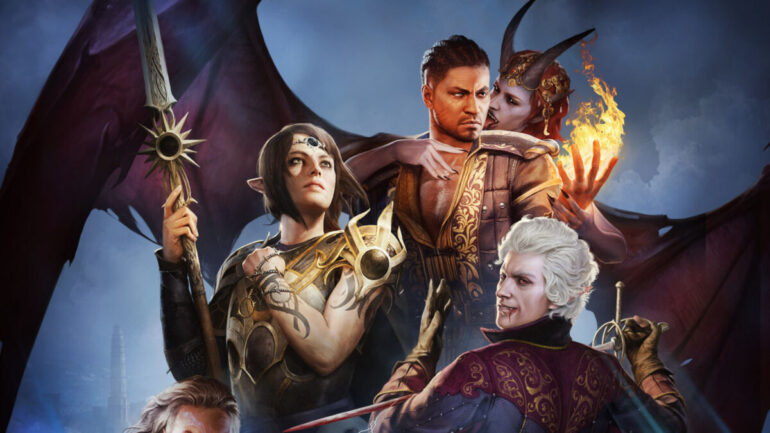Choosing a class can be daunting in any game. Once you make the choice, you are usually stuck with it for the rest of the game unless you want to restart. It’s important to get it right and oftentimes there are so many options that it’s hard to choose what’s right for you. Baldur’s Gate 3 is no exception to this and there are six strong classes to pick from.
Here’s a rundown of each Baldur’s Gate 3 class to help you decide which class is right for you.
Fighter
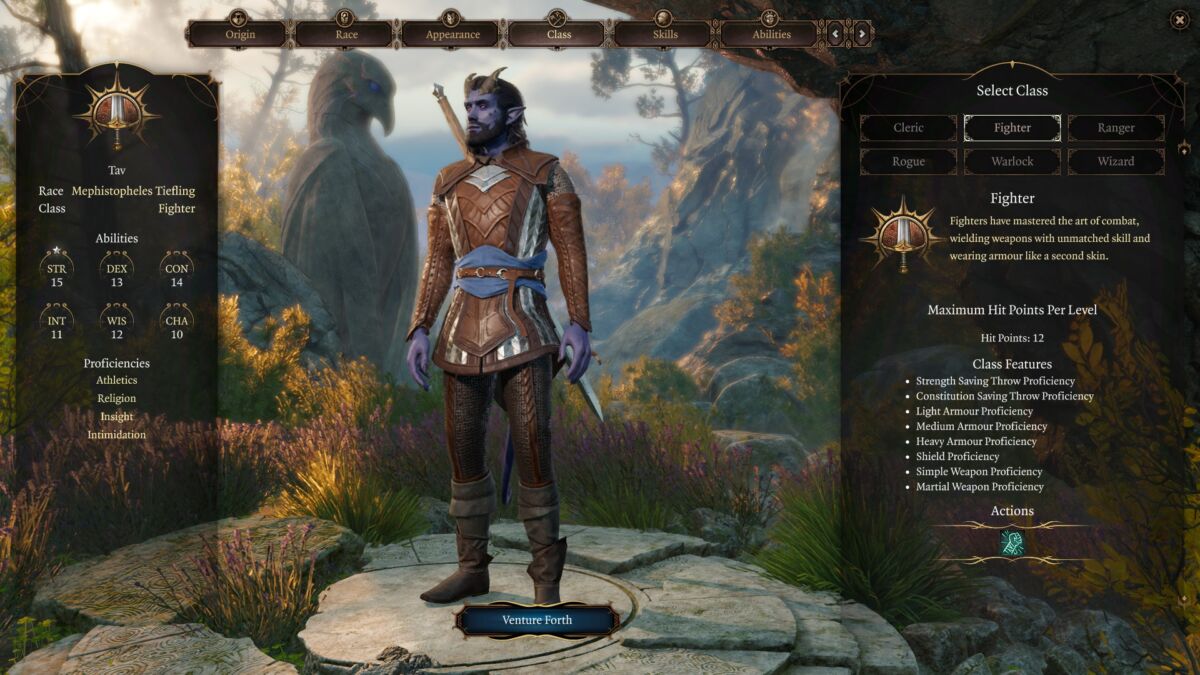
The Fighter class focuses on one thing, and only one thing: killing the enemy. The class relies on heavy hits and special attacks to smash their way through opponents both brutally and efficiently. There are a couple of ways you can play this class, but all of them will have you on the frontlines of a fight.
Three main options exist for the Fighter in terms of combat: dual-wielding weapons, double-handed weapons, or single-handed with a shield. I chose to play around with the sword and shield option for the most part due to wanting to be as tanky as possible, but the others are good too.
While the Fighter is a class that can do a significant amount of damage, it will also be the one taking the most amount of hits. Fighters rush into combat, so the enemy usually ends up targeting them before going for your backline spellcasters and such. Paired with a Wizard and a Cleric, though, and the Fighter class can handle even the most damaging attacks in the game.
Having a Fighter isn’t necessarily an essential component to completing the game, but they do help — a character who can soak up damage, especially in large encounters, can be a great boon. It is also the easiest class to learn how to play so it can be a good starter for new players. If running into the heat of combat and facing your enemies toe to toe is your thing then the Fighter should be at the top of your list.
Ranger
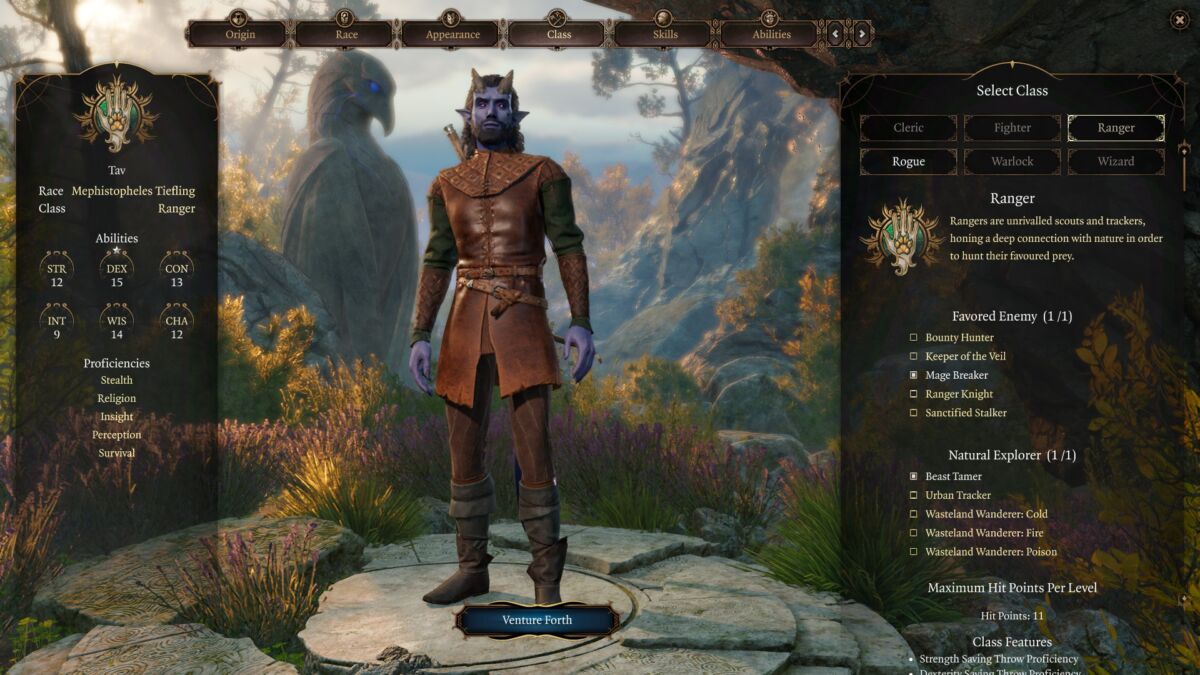
The Ranger class focuses on survival, hunting specific targets, and ranged attacks. It’s a unique class that offers a long list of options rather than having needed playstyles. It is a hugely customizable class with a lot of choices to create a unique playstyle.
For specializations, the Ranger focuses on specific targets that they are excellent fighting against. For example, a Ranger can choose to specialize against magic wielders, making them do increased damage against enemy spellcasters. There are more generalized options like Ranger Knight, which gives you proficiency in heavy armor, but it’s still a useful ability to have.
Honestly, Rangers have always been a weird class in DnD games. They have an odd specialization tree that makes them great in some situations while giving no benefit at all in others. The great thing is that this is probably the most customizable class in the game, so it can be fun to play around with.
Rangers don’t have a specific role and are friendly to people who want to create their own story and playstyle. You can be a frontline with heavy armor, an archer who takes out specific targets during combat, and so much more. If you want to have the freedom to create a sort of custom class then the Ranger is a good option.
Rogue
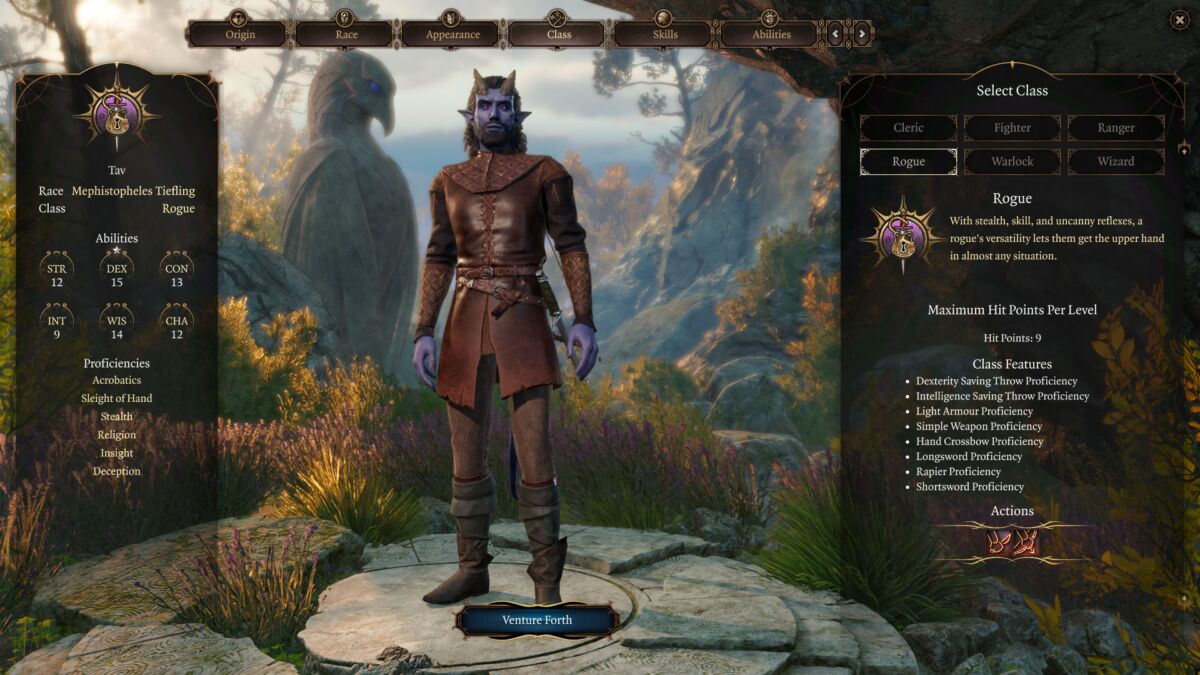
The Rogue class focuses on stealth and sneak attacks. Your role will be sneaking around in the dark and performing strong attacks. There aren’t any true specializations in the class, but you have a variety of skill sets you can put to use.
Rogues are proficient with nearly every one-handed weapon in the game and are also exceptional at archery and other ranged attacks. You could be an archer, a swordsman, or so much more. Like the Ranger, the Rogue is another class that leads to creative thinking.
One of the nicest things about Rogues is that they have very few skills that need rest to be replenished. Most of their abilities recharge every round so there’s no need to worry about running out of options.
Rogues have always been one of my favorite classes in DnD. They are often charming, smug, and altogether devious. Stealth is one of my favorite features both in combat and out as it can help you navigate the world and scout ahead without being caught. If dashing around the battlefield and going from combatant to combatant sounds fun, then the Rogue class is a solid choice.
Cleric

The Cleric class focuses on healing your party, protection from evil entities, and controlling the environment. There are a variety of spells and cantrips for you to choose from when leveling your character depending on what you want to do. Healing is the typical choice to go for, but it’s not the only viable option.
There are three domains that the Cleric can choose: Life, Light, and Trickery. Life is, of course, centered around healing your party and increasing your durability in combat. Light centers around fighting the undead, demons, and other dark creatures. Trickery, the one you’ll most likely deal with due to starting companions, is centered around crowd control against the enemy.
As far as spells and cantrips for the Cleric class go, there are a lot. I won’t be going over all of them, but there are a few you should get regardless of the domain you choose. Cure Wounds is one of the most important abilities in a Cleric’s roster, even if they aren’t specialized as a healer because it can heal someone in the fallen state from a distance. Typically, you need to be standing right next to a character in order to help them, so an ability to do this from far away is fantastic.
The other two special abilities I recommend for all Clerics are Inflict Wounds and Create Water. Inflict Wounds is one of the highest damage abilities at the beginning of Baldur’s Gate 3 and can take down some of the toughest enemies in a single strike if you’re lucky. Create Water, on the other hand, is for utility as there are a lot of hazardous fire environments in the game and this spell helps to mitigate that.
Clerics are one of the most useful classes in the game. If you do not choose to go Cleric then I recommend taking the companion along for the long haul. There is just so much utility both in and out of combat that makes the Cleric almost a necessity when playing. If healing others and manipulating the environment sound interesting to you then you might consider giving this class a shot.
Wizard
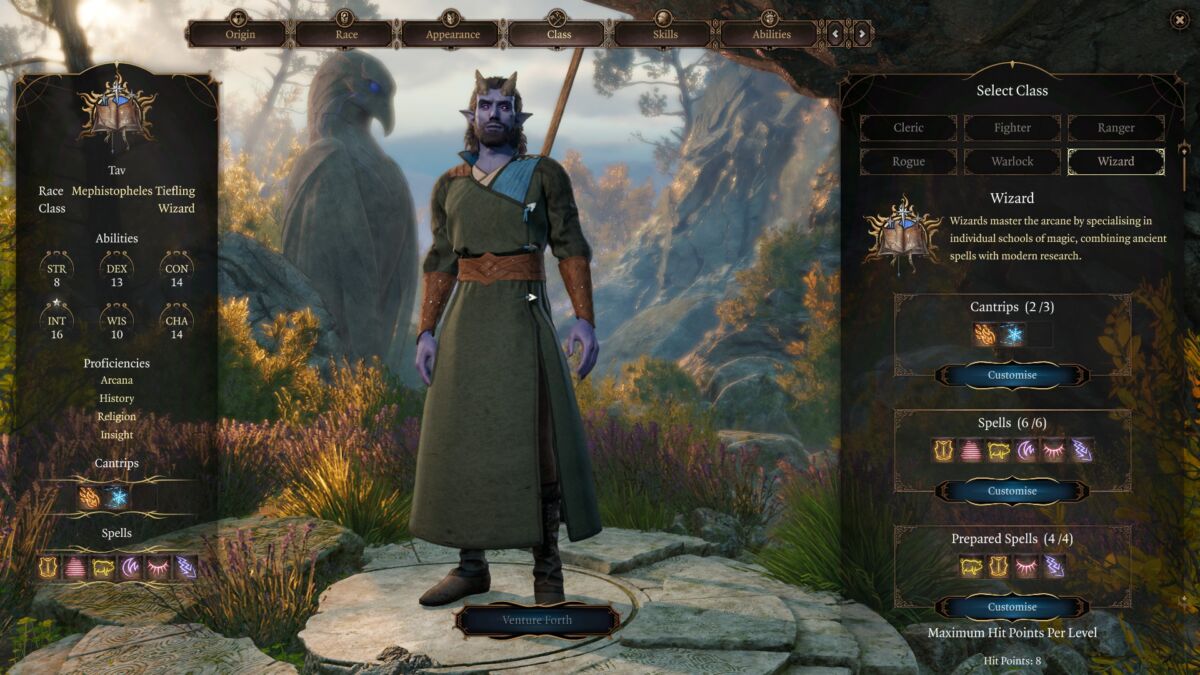
The Wizard class focuses on magic, both offensive and defensive, and is the primary magic class in the game with tons of accessible spells and cantrips.
You can perform spells from nearly every school of magic, but you will need to choose between two for your subclass. Once you reach level 2, you will be able to choose between Evocation and Abjuration as your specialization.
Evocation is focused on powerful elemental spells and destructive magic. You will use things like Lightning Strike and Fireball to blast your way through enemies. Choosing Evocation also gives you added benefits for casting spells over your other party members, giving instant success chances to saving rolls and protection.
Abjuration is focused on placing wards both on yourself and others. It’s a highly defensive specialization with the primary concern being avoiding or resisting damage. Evocation also gives you the benefit of having a natural ward on yourself that recharges with each spell performed. This ward gives you false life that gets taken before you start taking true damage.
Wizards have been called the best class in DnD games before and they are certainly a powerful option in Baldur’s Gate 3. They are versatile and have many great options for play, though I personally recommend Abjuration. If you want to play a class that gets to deal with magical manipulation and powerful spells, then the Wizard class may be right for you.
Warlock

Last, but certainly not least, we have the Warlock. The Warlock class focuses on manipulation, dark magic, and raw power. A Warlock, unlike the other magic users, gains their powers from a dark pact they made with an ancient entity. There are two options for who your pact is with, the Fiend or the Great Old One, which can greatly impact how you play.
The Fiend gives you benefits to destructive powers and raw damage output. Your primary spells will be things like Burning Hands or Fireball, which can do explosive damage to multiple enemy units and cause burning. Having the Fiend as your patron will mean your focus is on killing the enemy quickly, often taking out enemies in single strikes.
The Great Old One gives you benefits to psychic powers, intimidation, and perception. Your primary spells will be things like Tasha’s Hideous Laughter and Dissonant Whispers which help you control the battlefield by attacking the enemy’s minds. Having the Great Old One as your patron will mean your focus is on manipulating your opponents into doing your bidding, often causing longer yet more dynamic battles.
Warlocks can be one of the most effective tools in your arsenal in Baldur’s Gate 3. Their magical ability is only rivaled by Wizards and their ability to manipulate situations is great for avoiding some fights altogether. If you want to play a class that can do a lot of cool things both in and out of combat then you should give the Warlock class a go.
Hopefully, you now have a good idea about the different choices available to you in Baldur’s Gate 3. All of these classes are good in their own way so it’s not an easy decision. There’s no right or wrong class, just look for the one that fits with how you want to play and have fun with it.
READ NEXT: Baldur’s Gate 3 Combat Guide: Best Spells, Attacks & More
Some of the coverage you find on Cultured Vultures contains affiliate links, which provide us with small commissions based on purchases made from visiting our site. We cover gaming news, movie reviews, wrestling and much more.


